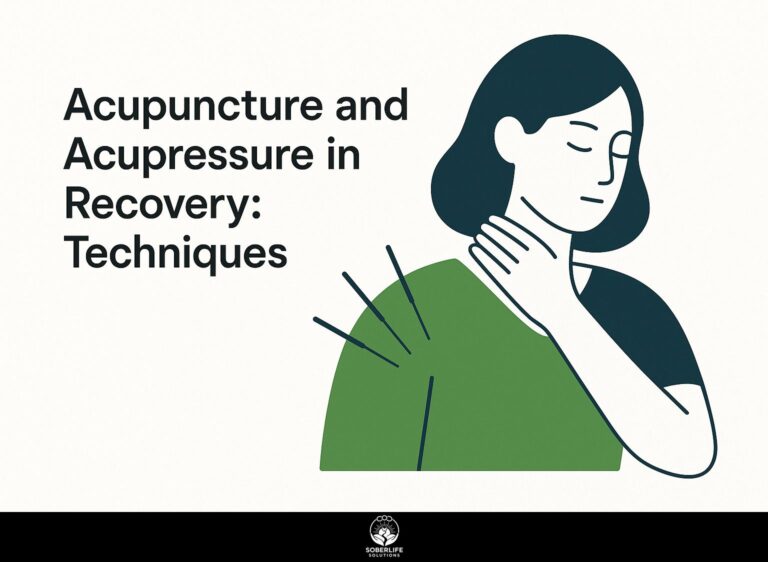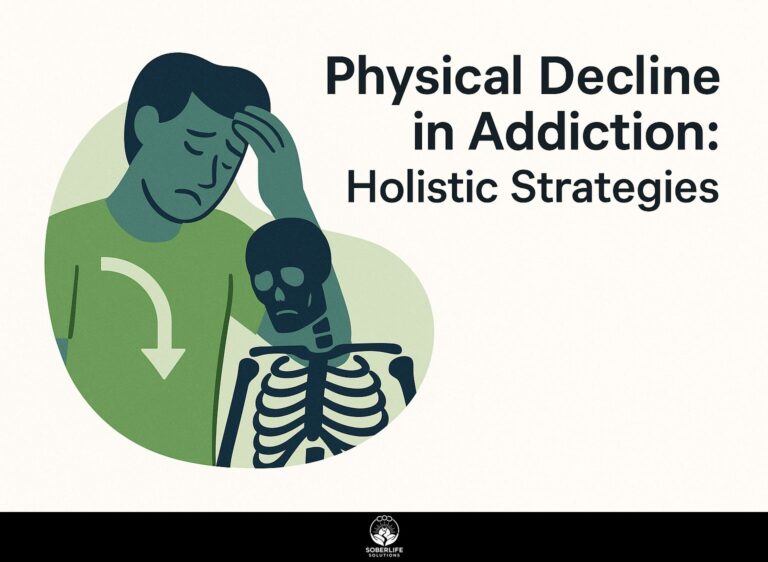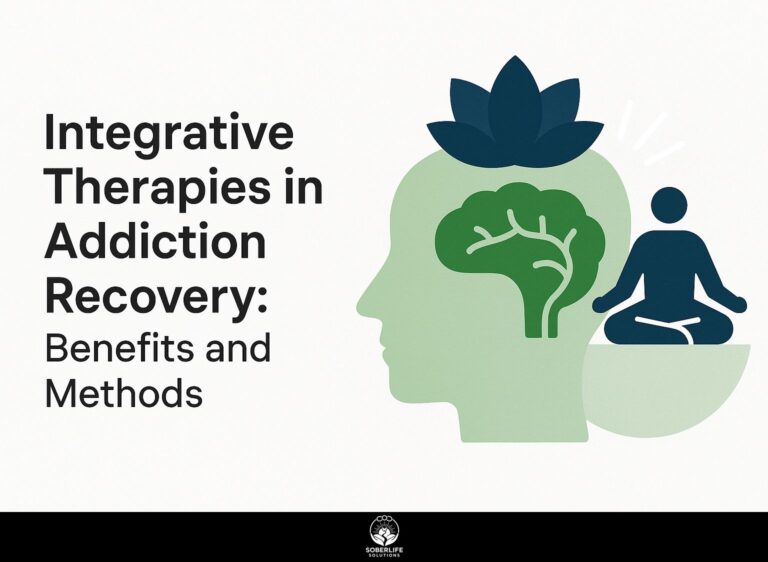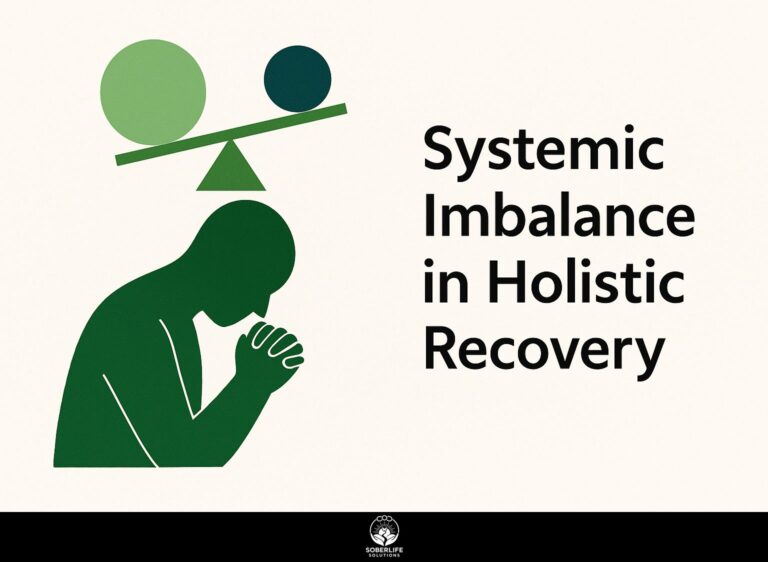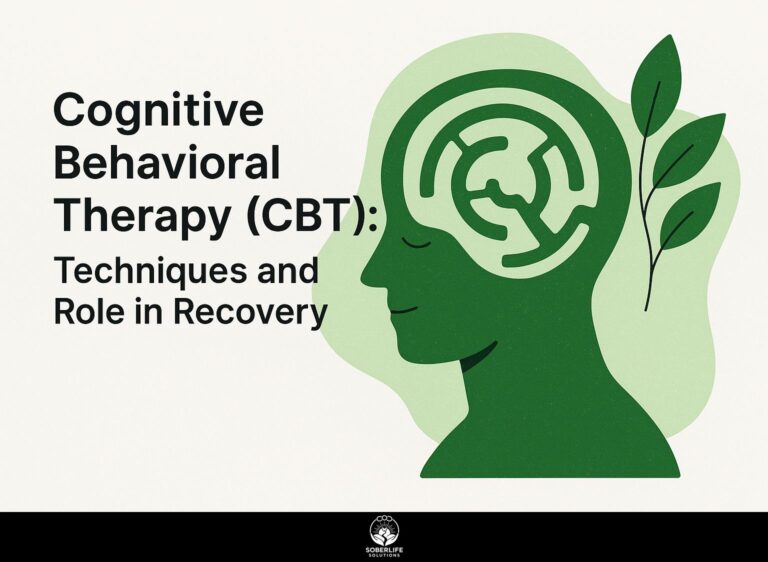Improving Sleep Patterns: Holistic Approaches in Recovery
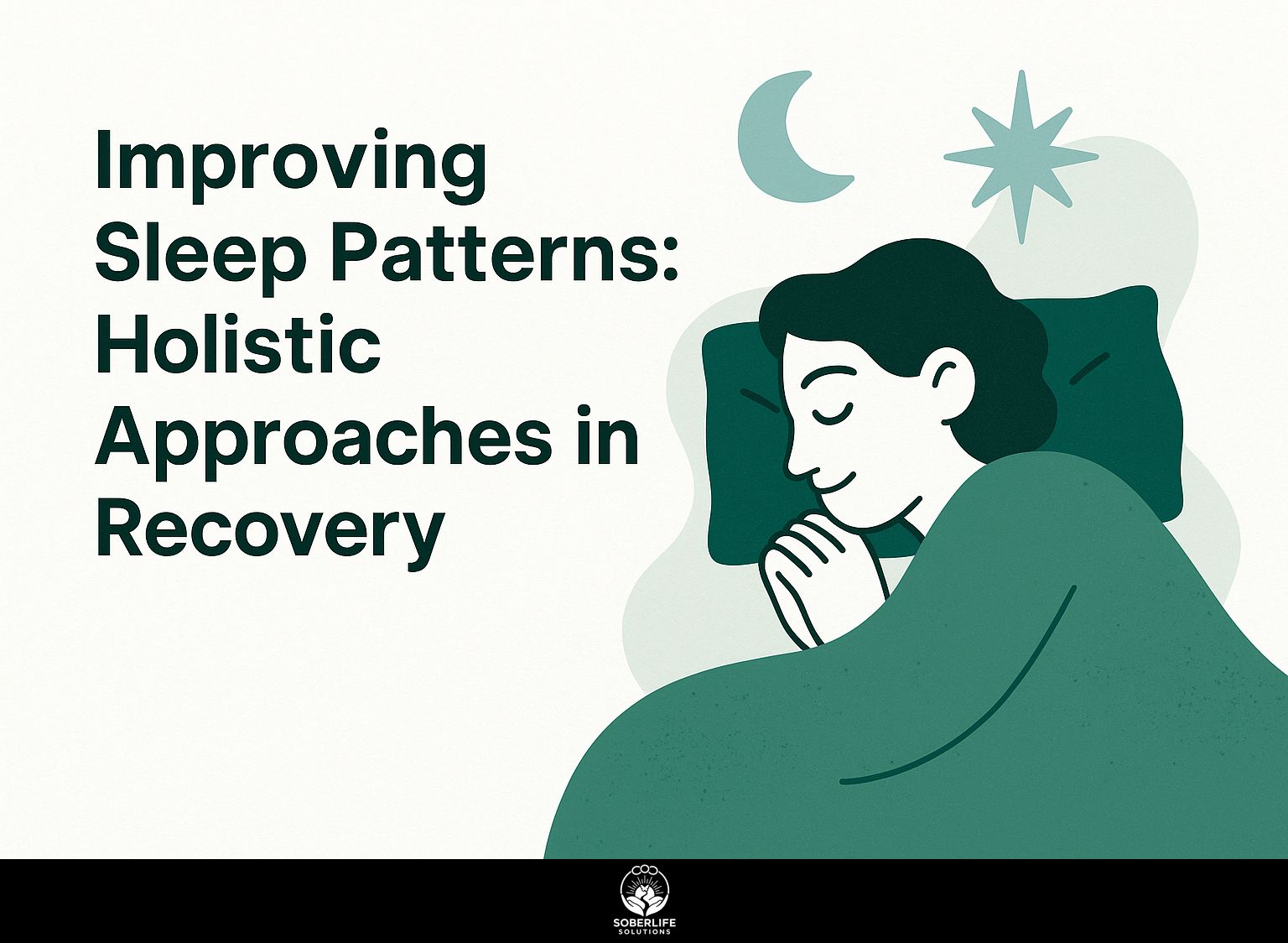
Do you find it hard to keep regular sleep habits while recovering? Getting enough sleep is essential for beating addiction and improving mental health. In this article, we’ll look at complete methods that improve your sleep quality, helping you build a better base for recovery. Learn practical ways to sleep better and feel healthier, from mindfulness exercises to nutrition advice. Your path to rejuvenating sleep starts here!
Key Takeaways:
The Importance of Sleep in Recovery
Getting enough sleep is important for recovery because it improves thinking and emotional balance, lowering the chance of relapse by up to 40%.
Research highlights that sleep quality directly influences emotional regulation, with studies showing that individuals with at least seven hours of sleep per night report better stress management and resilience. According to News Medical, sleep deficiency can lead to significant emotional dysregulation, impacting overall mental health.
Apps like Sleep Cycle or Fitbit can display sleep patterns, helping users make adjustments when necessary. Additionally, understanding how sleep intertwines with recovery can be enhanced by insights from our recent piece on fitness, nutrition, and sleep in addiction recovery.
Using relaxation methods like mindfulness meditation or deep breathing exercises before going to sleep can make your sleep better, which helps keep your emotions steady and supports long-term recovery goals.
Common Sleep Disorders
Sleep problems like insomnia impact about 30% of people in recovery, causing major interruptions in restful sleep.
Another prevalent disorder is sleep apnea, which affects about 10% of the adult population. Insomnia is characterized by difficulty falling or staying asleep, leading to fatigue and irritability.
In contrast, sleep apnea causes interrupted breathing during sleep, resulting in loud snoring and daytime exhaustion. Both disorders can hinder recovery by impairing cognitive function and increasing stress levels.
For effective management, consider using tools like sleep trackers (e.g., Fitbit), cognitive behavioral therapy for insomnia (CBT-I), or consult a healthcare provider for potential sleep studies. In fact, the American Heart Association emphasizes the importance of addressing sleep disorders to mitigate their impact on cognitive function and stress.
Understanding Holistic Approaches
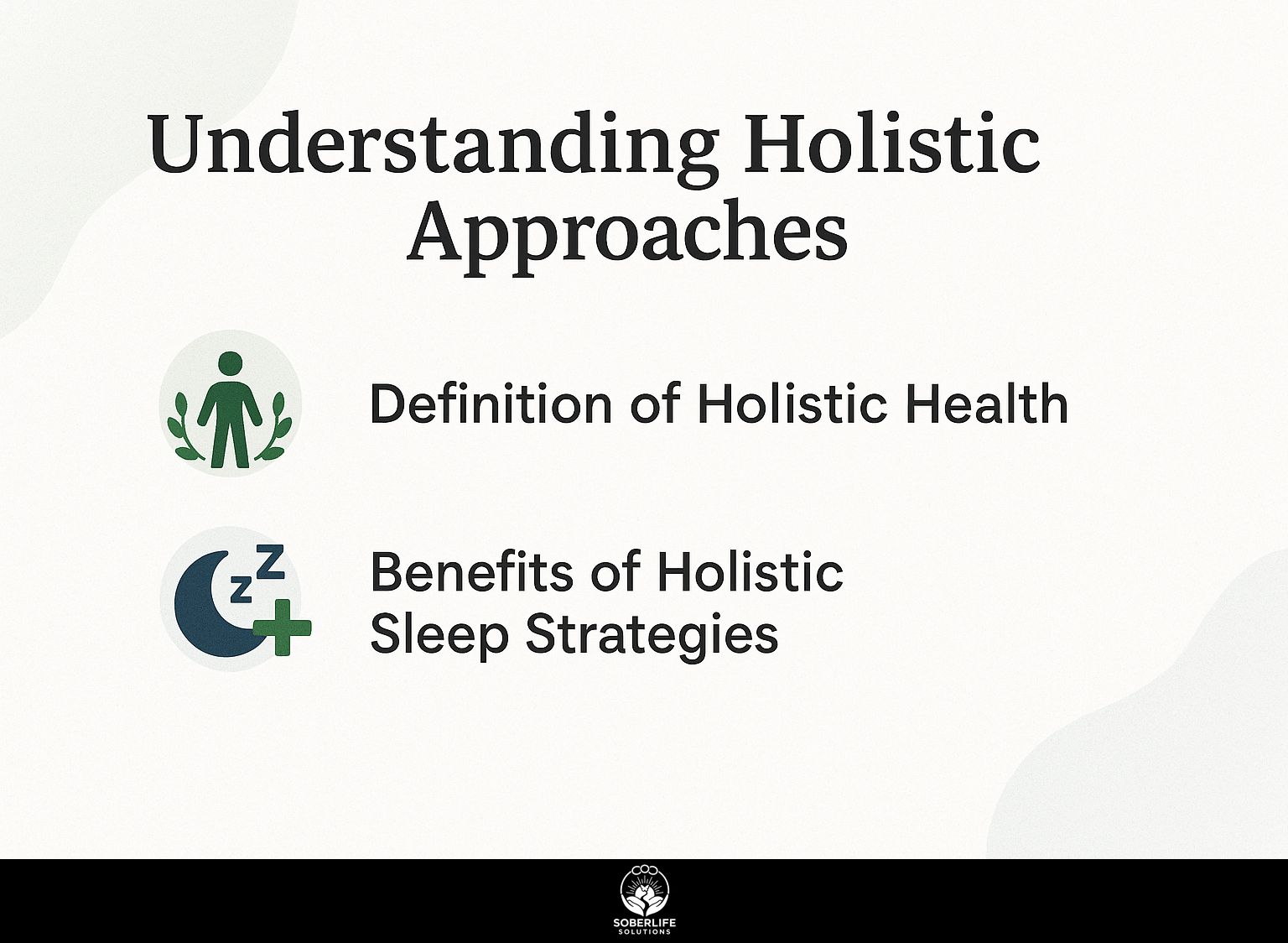
Treating the entire individual by focusing on their physical, emotional, and mental health can greatly improve sleep patterns. Holistic therapies, which are increasingly integrated into rehabilitation programs, offer diverse methods to enhance overall well-being and recovery. Learn more about the types and benefits of holistic therapy in rehab.
Definition of Holistic Health
Holistic health brings together various treatments, focusing on the connection between the mind, body, and emotions.
This approach is particularly relevant in treating addiction, as it recognizes that recovery involves more than just abstaining from substances.
For example, using treatments like cognitive behavioral therapy (CBT) helps with mental habits, while yoga improves physical control and allows for emotional expression. Getting advice on nutrition can improve overall health, lift your spirits, and support long-term healing.
Creating a detailed treatment plan with these components helps individuals manage stress and cravings more effectively, leading to a longer-lasting recovery. For those interested in a comprehensive overview, Medical News Today covers the full spectrum of holistic therapy benefits.
Benefits of Holistic Sleep Strategies
Using complete sleep methods can make sleep better and longer by up to 50%, which helps with recovery.
To gain these benefits, try adding practices like mindfulness meditation, keeping a regular sleep schedule, and having a relaxing bedtime routine.
For example, using apps like Headspace for guided meditation can improve relaxation before sleep. Having a regular sleep schedule stabilizes your body’s natural rhythm.
Making your bedroom dark and cool can greatly improve your sleep, helping you manage emotions better and recover.
Mindfulness and Meditation
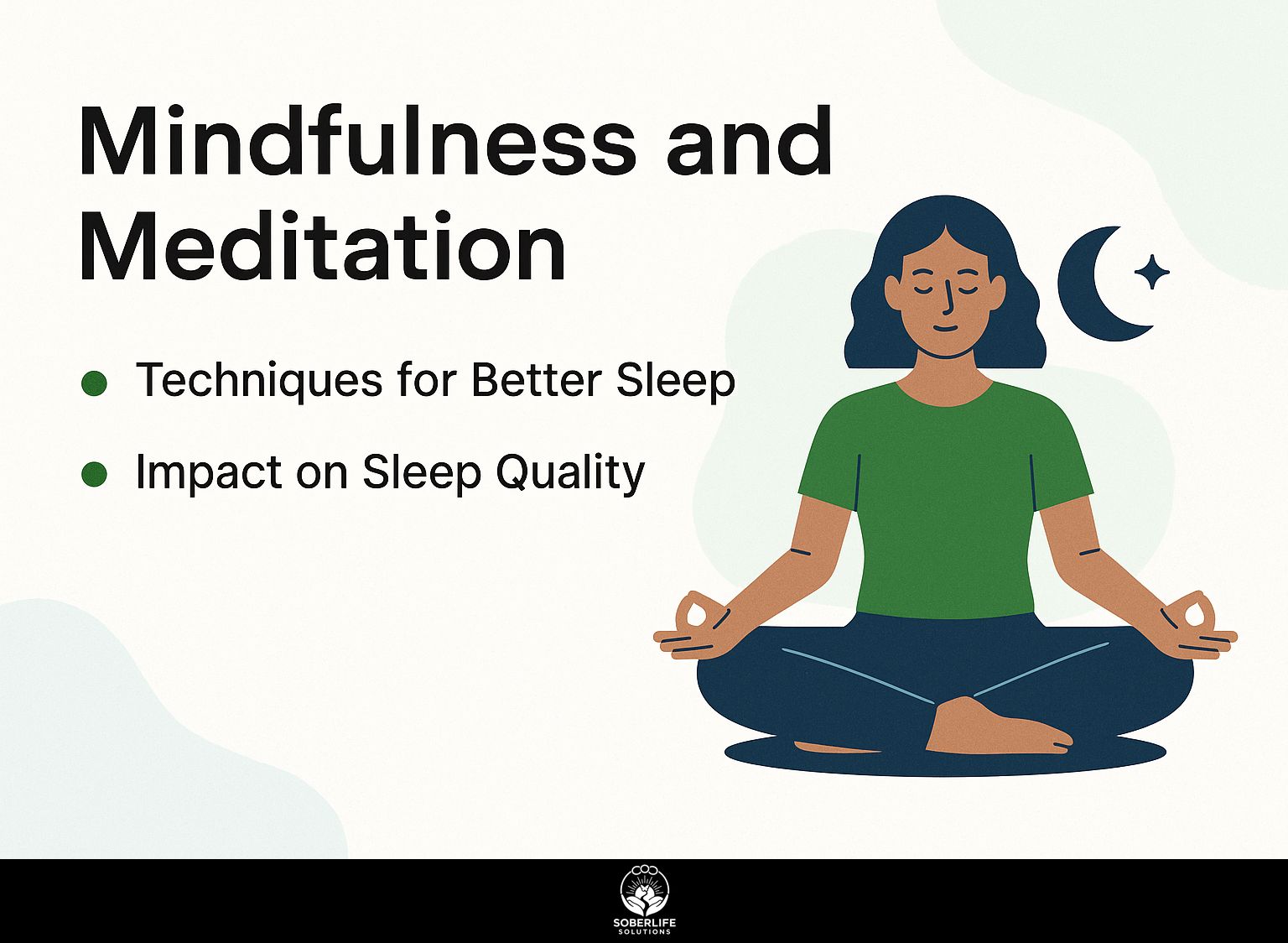
Practicing mindfulness and meditation can improve sleep quality by lowering anxiety and encouraging calmness, with studies showing a 45% betterment in sleep patterns. For those seeking a comprehensive approach, incorporating mindfulness as part of your recovery techniques can further enhance these benefits by also focusing on stress reduction.
Techniques for Better Sleep
Methods like deep breathing and setting up a bedtime routine can help people fall asleep up to 30 minutes faster as they recover.
Incorporating deep breathing exercises throughout your evening can significantly lower stress. Try the 4-7-8 technique: inhale for 4 seconds, hold for 7, and exhale for 8.
Establishing a calming bedtime routine-such as dimming the lights, reading a book, or practicing gentle yoga-signals your body that it’s time to wind down. Begin this routine at least an hour before bedtime to create a regular sleep environment.
Using apps like Calm or Headspace can also guide you through relaxation exercises, helping further improve your sleep quality.
Impact on Sleep Quality
Regular mindfulness practices can lead to a measurable increase in sleep quality, contributing to improved emotional health and cognitive function.
A study published in ‘JAMA Internal Medicine’ found that participants practicing mindfulness meditation improved their sleep quality significantly over six weeks.
A 2015 research in ‘Sleep Health’ reported that individuals engaging in mindfulness techniques experienced 30% fewer sleep disturbances.
To improve sleep with mindfulness, try apps like Headspace or Calm. They provide meditation exercises aimed at helping you relax before going to bed.
Regular practice, even just 10 minutes a day, can help lower anxiety and promote deeper, more restorative sleep.
Nutrition and Sleep
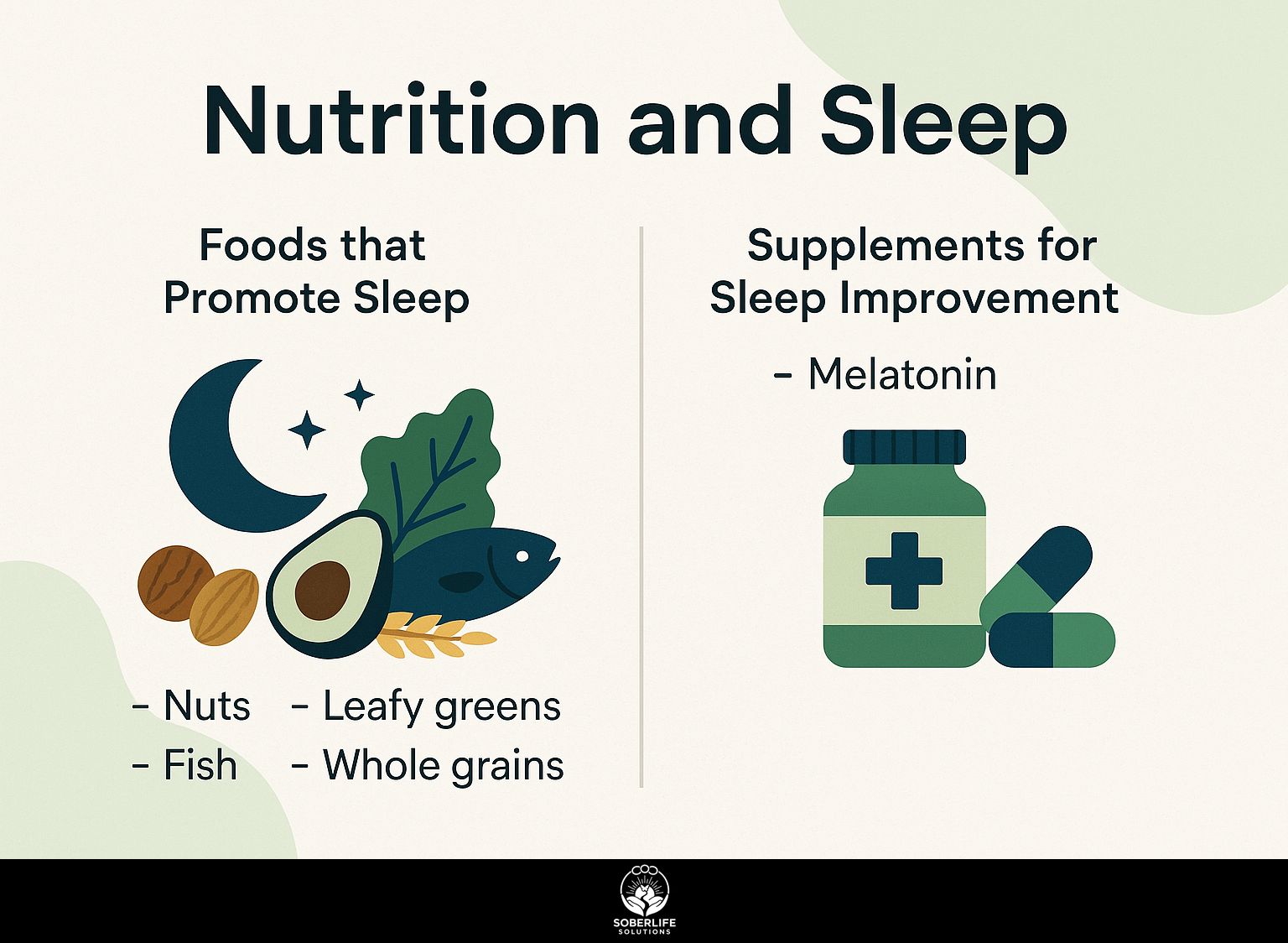
Eating well is important for good sleep. Certain foods can improve sleep quality, and some supplements can help with sleep issues. If interested, you can learn more about the close connection between fitness, nutrition, and sleep in addiction recovery.
Foods that Promote Sleep
Including foods high in magnesium and tryptophan, like almonds and turkey, can improve sleep quality and lessen cravings linked to withdrawal.
Other beneficial foods include chamomile tea, which contains antioxidants that may promote relaxation, and fatty fish like salmon, rich in omega-3 fatty acids and vitamin D, both essential for regulating sleep patterns.
Bananas provide potassium and magnesium, helping to relax muscles and nerves. To increase nutrition, add nuts, seeds, and leafy greens to your meals.
Try to include these foods in your evening meals or snacks to make the most of their ability to improve sleep, helping you create a calming bedtime routine.
Supplements for Sleep Improvement
Supplements such as melatonin and valerian root have shown effectiveness in improving sleep for individuals experiencing withdrawal symptoms.
Melatonin is typically recommended at a dosage of 1-5 mg taken 30-60 minutes before bedtime. It helps control the sleep-wake cycle, which is helpful for dealing with insomnia caused by withdrawal.
Valerian root, on the other hand, is often suggested at doses between 300-600 mg, also before sleep.
These supplements are more effective if you also go to bed at the same time each night and reduce screen time before sleeping. Always consult with a healthcare professional before starting any new supplement regimen.
Physical Activity
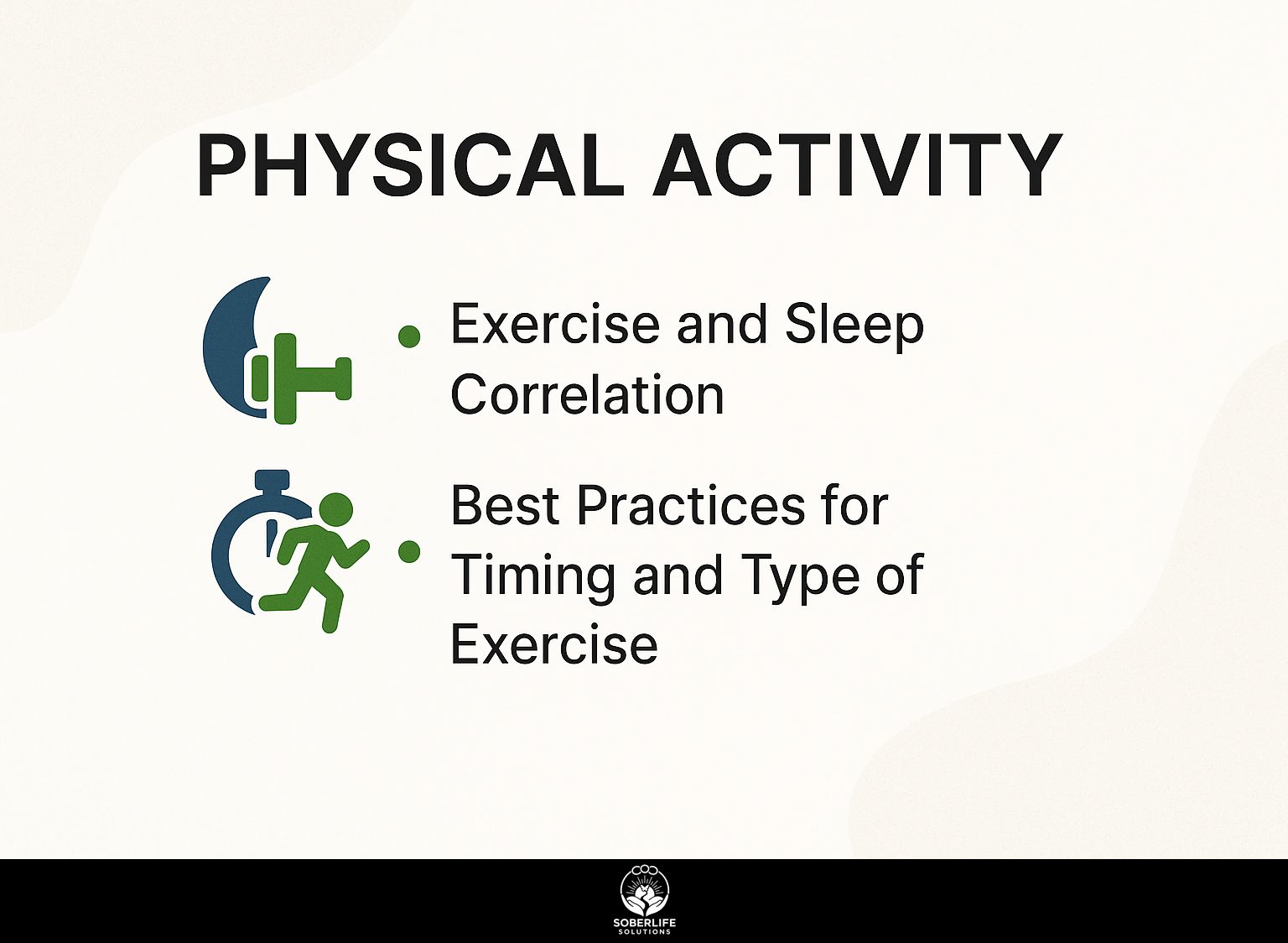
Exercising regularly can help you sleep an extra hour and lessen problems related to sleep issues often encountered during recovery.
Exercise and Sleep Correlation
Studies indicate a strong correlation between regular exercise and improvements in sleep quality, with a reduction in sleep disturbances by as much as 20%.
Studies show that doing moderate exercise, such as brisk walking or cycling for at least 30 minutes a day, greatly improves sleep quality.
For people overcoming addiction, exercise serves as a natural way to reduce stress and increase endorphins, which can help with sleep problems.
Setting a consistent workout schedule helps regulate the body’s internal clock, leading to more restorative sleep cycles.
Incorporating activities like yoga or tai chi may also be beneficial, as they combine physical movement with mindfulness, further reducing anxiety and improving sleep patterns.
Best Practices for Timing and Type of Exercise
Best practices suggest exercise should be completed at least 3 hours before bedtime to maximize sleep benefits and minimize disturbances.
Engaging in moderate aerobic activities, such as brisk walking or cycling, promotes deeper sleep. Try to get at least 150 minutes of exercise each week, spread out over a few days.
Lifting weights, a form of resistance training, can greatly improve sleep. Doing this twice a week can lead to better sleep quality. Consider yoga or stretching exercises on rest days, as they reduce stress and encourage relaxation.
Tracking your activities with apps like MyFitnessPal or Fitbod can help maintain consistency and encourage you to meet these goals effectively.
Creating a Sleep-Conducive Environment
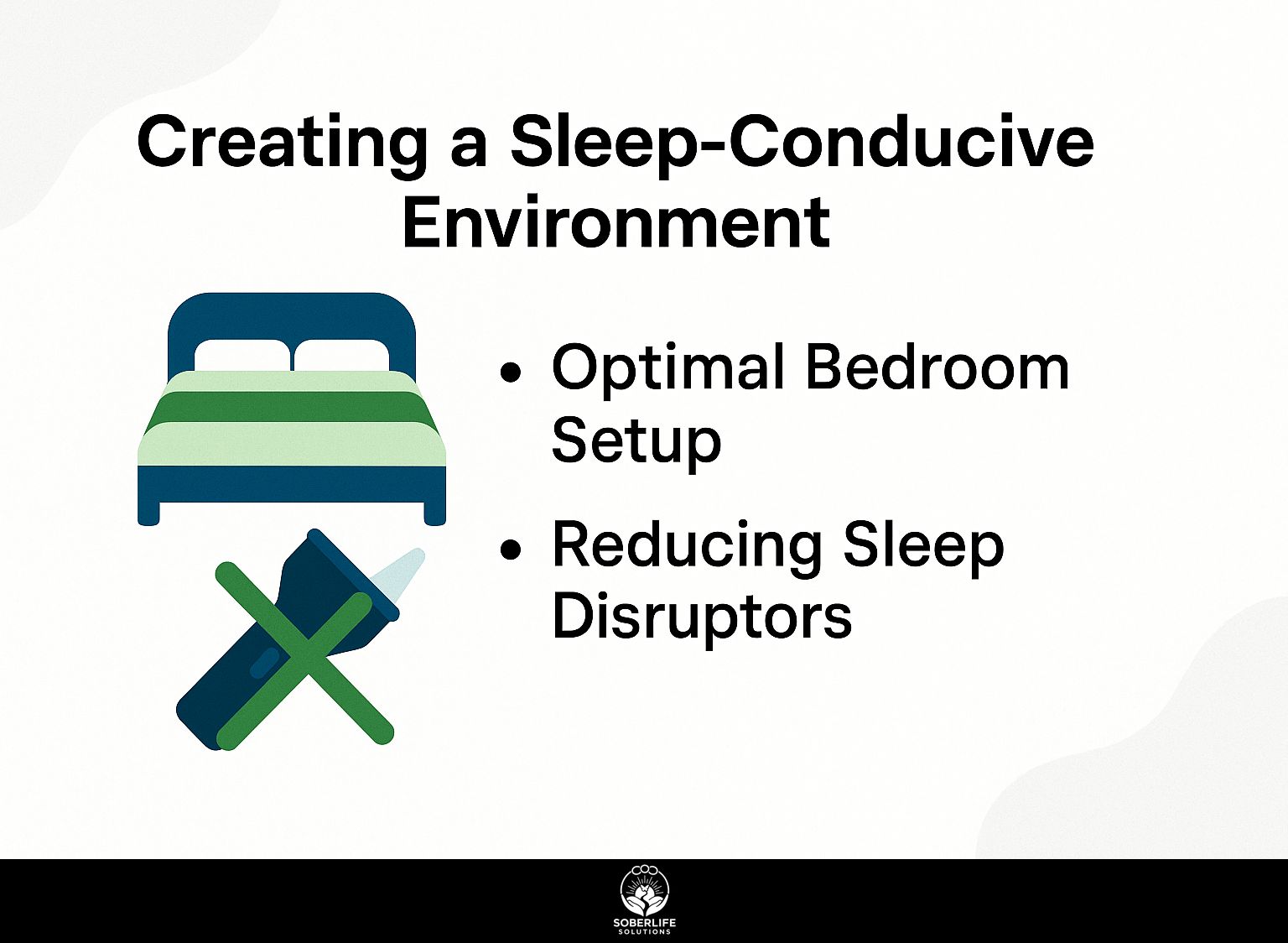
Setting up a comfortable space for sleeping can make a big difference in how well you sleep. Research indicates that good conditions can increase the length of sleep by 30%.
Optimal Bedroom Setup
A good bedroom setup includes a cool, dark room and cozy bedding, which can greatly improve sleep and decrease interruptions.
To create this sleep-conducive environment, consider these actionable adjustments:
- Keep your bedroom temperature between 60-67 degreesF to promote deeper sleep.
- Use blackout curtains to reduce light and think about using a white noise machine to cover up bothersome sounds.
- Buy top-quality bedding like a memory foam mattress or sheets that allow air to pass through for better comfort.
- Remove electronic devices that emit blue light, which can interfere with your circadian rhythm.
You can make these changes to create a more calming space for better sleep.
Reducing Sleep Disruptors
Finding and cutting down on things that disturb sleep, such as gadgets and caffeine, can make sleep better and help manage emotions.
To deal with these interruptions, create bedtime habits that focus on good sleep practices.
- Set a screen time limit of one hour before bed to minimize blue light exposure, which interferes with melatonin production.
- Consider substituting caffeine with herbal teas, like chamomile or peppermint, in the afternoon.
- Keep your bedroom dark and cool.
- Implement relaxation techniques such as deep breathing or meditation for at least 10 minutes each evening.
These actions can greatly improve your sleep quality and emotional balance over time.
Frequently Asked Questions
What are effective ways to improve sleep patterns during recovery?
Improving sleep during recovery involves focusing on mental, physical, and emotional well-being to achieve a more balanced and restful state. This may include practices such as meditation, exercise, and creating a relaxing sleep environment.
How does meditation help improve sleep patterns in recovery?
Meditation can help improve sleep patterns in recovery by promoting relaxation, reducing stress and anxiety, and creating a more peaceful and calm state of mind. This can lead to a better quality of sleep and improved overall well-being.
What role does exercise play in improving sleep patterns during recovery?
Regular exercise has been found to improve sleep patterns in recovery by reducing tension and stress in the body, promoting relaxation, and balancing hormones. It can also improve overall physical and mental health, which can contribute to better sleep.
How can creating a relaxing sleep environment aid in improving sleep patterns during recovery?
Creating a relaxing sleep environment can aid in improving sleep patterns during recovery by promoting a sense of calm and serenity in the bedroom. This can include eliminating distractions, using comfortable bedding and pillows, and incorporating soothing scents or sounds.
Can incorporating a healthy diet help improve sleep patterns in recovery?
Yes, incorporating a healthy diet can help improve sleep patterns in recovery by providing the body with the necessary nutrients and vitamins it needs to function properly. This can include avoiding caffeine and sugar, and incorporating foods that promote relaxation and better sleep, such as almonds, cherries, and herbal teas.
How does addressing the mind, body, and spirit as a whole contribute to better sleep patterns in recovery?
Addressing the mind, body, and spirit as a whole can contribute to better sleep patterns in recovery by creating a more balanced and harmonious state. By incorporating practices that promote mental, physical, and spiritual well-being, individuals can experience improved sleep and a deeper sense of overall wellness.

